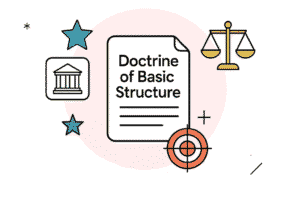Becoming a judge in India is not just about wearing the robe; it’s about shaping society, delivering fairness, and making a lasting impact on the legal system. Judges are the true guardians of justice, equality, and constitutional values.
Let’s dive into the reasons why becoming a judge is not just a career choice, but a noble journey for those passionate about justice 👇
Upholding the Rule of Law: The Cornerstone of Democracy

Judges play a crucial role in ensuring that justice is served and rights are protected.
- Impartiality is at the core of a judge’s responsibility, ensuring the rule of law is upheld.
- The independence of the judiciary is essential to maintaining public confidence in the legal system.
- Judges protect the fundamental rights of individuals, keeping democracy intact.
Contributing to Social Justice: Making a Difference
Fighting for Equality
Judges have the unique opportunity to impact society by addressing issues affecting marginalized and vulnerable groups. Through their rulings, they can bring about social change, protect fundamental rights, and ensure justice for all.
- Their decisions ensure that justice is delivered to everyone, regardless of background or status.
- Social justice is not just a concept for judges; it’s an ongoing, tangible effort in the courtroom.
A Position of Respect and Authority: Leading with Integrity
The judicial profession is one of the most respected in India. Judges are regarded as the ultimate arbiters of justice, and their decisions can change the course of history.
- The authority of a judge comes with great responsibility to make fair, just, and impartial decisions.
- For those who value respect, integrity, and accountability, becoming a judge is a powerful platform to showcase these qualities.
Intellectual Challenge and Continuous Learning: A Career for the Mind
Endless Learning
The role of a judge is intellectually stimulating, demanding a deep understanding of complex legal principles.
- Judges are tasked with analyzing vast amounts of information and synthesizing them to arrive at sound decisions.
- The diversity of cases ensures that every day offers a new intellectual challenge, making the work never monotonous.
Contribution to Legal Precedent: Shaping the Law

Judges have the power to shape the law through their rulings.
- Landmark decisions often set legal precedents, guiding future cases.
- By becoming a judge, you directly contribute to the evolution of legal standards and principles, leaving a lasting legacy in the judicial system.
Ensuring Fairness and Equality: A Judge’s Commitment
A Fair Trial for All
A judge’s primary role is to ensure that everyone receives a fair trial, regardless of their background or resources.
- The commitment to fairness and equality is central to the judicial role.
- Judges have the power to correct injustices, ensuring that the legal system works equally for all.
Personal Fulfillment and Satisfaction: Serving a Greater Purpose
The fulfillment of serving as a judge goes beyond financial rewards. It comes from the responsibility of upholding justice, shaping the law, and making a lasting impact on society.
- The personal satisfaction of knowing your decisions change lives, uphold justice, and contribute to society is immeasurable.
- For many, this sense of purpose is what fuels their dedication to the judiciary.
Long-Term Career Stability: A Secure Path to Respect and Recognition
The judicial career offers long-term security and stability, providing judges with a steady and respected position within society.
- Judges typically serve until retirement, enjoying a respected career that guarantees prestige and authority.
- If you’re looking for a rewarding, secure, and respectable career, the judiciary offers it in abundance.
Work-Life Balance: Striking the Right Harmony
While the judiciary is demanding, it provides a more structured work schedule compared to other legal careers, particularly private practice.
- Judges enjoy predictable hours, leaving time for personal life and family.
- This balance can be especially appealing for those who value quality time outside of work.
Conclusion: A Rewarding Career in Service to Justice
Becoming a judge in India is both a privilege and a responsibility. It grants individuals the opportunity to serve the nation while upholding the law and ensuring justice for all. The role carries immense respect but also significant challenges.
- Intellectual growth, social contribution, and career stability make it one of the most rewarding professions.
- As a judge, you are not just interpreting the law; you are shaping the future of justice, equality, and society.
Ready to embark on this law journey?
Let Edzorb Law Help You On Your Path to the Bench!

Start your judicial career journey with Edzorb Law:
- Structured study plans
- Expert mentorship
- Mock tests & exam strategies
Download Edzorb Law App and take the first step toward becoming a judge today!

 Podcast
Podcast








 Features
Features






